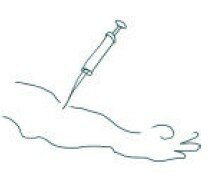Also see
First Rituxan Day - Checklist | When to Call your Doctor | Treatment Support
PDF version of this page
Blood Draws and IVs:
 Tips for Minimizing Anxiety and Pain during blood draws and IV preparations Tips for Minimizing Anxiety and Pain during blood draws and IV preparations
"Some people have veins that are quite small and difficult to access. Some veins are scarred from repeated punctures to the vein or occluded (blocked).
People undergoing chemotherapy, for example, and those being monitored for side effects while taking coumadin may have more difficulty during a blood draw because their veins have been punctured so often. For these individuals, venipuncture can involve more than one needle stick." 1
Tips provided by patients and online sources
.gif) |
"Avoid caffeine and alcohol for 24 hours before the stick." ~ Don (Nhl-follic)
|
.gif) |
Warm the skin with moist compresses for about 10 minutes facilitates blood flow to the area 1
This allows the veins to dilate and the skin to soften. 4 ~ Don & Tony
|
.gif) |
Be well hydrated.
Specifically ask your doctor if it is ok to have water before the time of the IV.
"Many procedures say nothing to eat or drink for some number of hours but plain
water is often allowed." ~ Don (Nhl-follic)
|
.gif) |
Be politely assertive:
Some people who know their blood is difficult to draw always request the technician
with whom they have had the best results. 1
.gif) |
tell the technician the good spots to try or the needles,
techniques, or instruments that work well.1
|
.gif) |
Tell the technician which arm to use to avoid the lymph nodes more prone to infection. 1
|
.gif) |
"Ask for an expert. I know every tech needs to learn but after this much time,
I'm through being the practice dummy. Trust me, the trainees don't want a
"hard stick" any more than you want a trainee."
|
Ask about:
.gif) |
Numbing creams to reduce pain, such as EMLA cream 1
|
.gif) |
Finger-Stick Tests 1
Complete blood counts can be obtained this way. This option is available at most large medical centers. Caveat: While quick and less intimidating, there are plenty of nerve cells in this area.
|
.gif) |
Catheters and Ports 1
If you know you need frequent blood draws over a period of time
and your blood draws are requiring three or more attempts before they are successful,
ask about the availability and advisability of using ports or catheters.
Caveat: Discuss risk of infection.
|
|
.gif) |
"Ask to have the IV started while you are lying down." ~ Don (Nhl-follic)
This can be important since some facilities like to start the IV while you are in another
location from the test and seated. I get much better results when I'm horizontal.
|
.gif) |
Try to relax.
"Tense muscles only make it worse." Caregivers: Try distracting your loved one with conversation.
Bring a cassette player with earphones so you can listen to some soft music, or a relaxation tape.4
Breathe slowly and easily, and refrain from holding your breath while the IV is being inserted.
After the IV is in place, you can request a warm towel to be wrapped around the site to keep the veins dilated. This is also a nice addition if you are being infused with a solution
that is cold, i.e. blood transfusions. Having an IV placed can be an uncomfortable experience.4
|
"After it is all over, try to see a picture in the bruise. I've never
managed the Virgin Mary but the last one looked like Pepe Le Pew. " ~ Don (Nhl-follic)
Resources
-
Tips on Blood Testing labtestsonline.org
-
Blood Draws: When your veins and blood aren't cooperating anapsid.org
Do your veins submarine and disappear as soon as a needle hovers over your arm?
Does your blood flow, but s l o w l y? Does it take forever to get an IV solution to run into you? Here are some things your IV nurse and phlebotomist/venipuncturist may not tell you or think of to try...
-
Oncology Nursing Tips cancersupportivecare.com
|